- Home
- John Cheever
Falconer Page 11
Falconer Read online
Page 11
The crimson of the cardinal’s robes seemed living and pure and his carriage was admirable and would have quelled a riot. He stepped out of the helicopter, lifting his robes not at all like a woman leaving a taxi but like a cardinal leaving his airborne transport. He made a sign of the cross as high and wide as his reach and the great spell of worship fell over that place. In nomine Patris et Filii et Spiritus Sancti. Farragut would have liked to pray for the happiness of his son, his wife, the safety of his lover, the soul of his dead brother, would have liked to pray for some enlargement of his wisdom, but the only word he could root out of these massive intentions was his Amen. Amen, said a thousand others, and the word, from so many throats, came up from the gallows field as a solemn whisper.
Then the public address system began to work so well that the confusion that followed could be heard by everyone. “Now you go first,” said the commissioner to the warden. “No, you go,” said the warden to the commissioner. “It says here that you go.” “I said you go,” said the commissioner angrily to the warden, and the warden stepped forward, knelt, kissed the cardinal’s ring and, standing, said: “The graciousness of Your Eminence in endangering life and limb in order to come and visit us in the Falconer Rehabilitation Center is greatly appreciated by me and the deputy wardens, the guards and all the inmates. It reminds me of how when I was a little boy and sleepy my father carried me from the car into the house at the end of a long trip. I was a load to carry, but I knew how kind he was being to me, and that’s the way I feel today.”
There was applause—exactly the noise of water striking stone—but unlike the indecipherable noise of water, its intent was clearly grateful and polite. Farragut remembered applause most vividly when he had heard it outside the theater, hall or church where it sounded. He had heard it most clearly as a bystander waiting in a parking lot pn a summer night, waiting for the show to break. It had always astonished and deeply moved him to realize that so diverse and warlike a people could have agreed on this signal of enthusiasm and assent. The warden passed the public address system to the commissioner. The commissioner had gray hair, wore a gray suit and a gray tie, and reminded Farragut of the grayness and angularity of office filing cabinets in the far, far away. “Your Eminence,” he said, reading his speech from a paper and evidently for the first time. “Ladies and gentlemen.” He frowned, raised his face and his heavy eyebrows at this error of his speech writer. “Gentlemen!” he exclaimed. “I want to express my gratitude and the gratitude of the governor to the cardinal, who for the first time in the history of this diocese and perhaps in the whole history of mankind has visited a rehabilitation center in a helicopter. The governor sends his sincere regrets at not being able to express his gratitude in person, but he is, as you must all know, touring the flood-disaster areas in the northwestern part of the state. We hear these days”—he picked up a head of steam—“a great deal about prison reform. Best sellers are written about prison reform. Professional so-called penologists travel from coast to coast, speaking on prison reform. But where does prison reform begin? In bookstores? In lecture halls? No. Prison reform, like all sincere endeavors at reform, begins at home, and where is home? Home is prison! We have come here today to commemorate a bold step made possible by the Fiduciary University of Banking, the archdiocese, the Department of Correction and above all the prisoners themselves. All four of us together have accomplished what we might compare—compare only, of course—to a miracle. These eight humble men have passed with honors a most difficult test that many well-known captains of industry have failed. Now, I know that you all have, unwillingly, sacrificed your right to vote upon coming here—a sacrifice that the governor intends to change—and should you, at some later date, find his name on a ballot I’m sure you will remember today.” He shot his cuff to check the time. “As I present these coveted diplomas, please refrain from applause until the presentation is completed. Frank Masullo, Herman Meany, Mike Thomas, Henry Phillips …” When the last of the diplomas had been presented, he lowered his voice in a truly moving shift from secular to spiritual matters and said, “His Eminence will now celebrate mass.” At exactly that moment Jody came out of the boiler room behind the bench, genuflected deeply at the cardinal’s back and took his place at the right of the altar, the consummate figure of a tardy acolyte who has just taken a piss.
Adiutorium nostrum in Nomine Domini. The raptness of prayer enthralled Farragut as the raptness of love. Misereatur tui omnipotens Deus et dismissis pecatis tuis. Misereatur vestri omnipotens Deus et dismissis pecatis vestris perducat vos ad vitam aeternam. Indulgentiam, absolutionem, et remissionem pecatorum nostrorum tribuat nobis omnipotens et misericors Dominus. Deus tu conversus vivificabis nos. Ostende nobis, Domine misericordiam tuam. On it drummed to the Benedicat and the last Amen. Then he performed another large cross and returned to the helicopter, followed by his retinue, including Jody.
The props kicked up a cloud of dust and the engine ascended. Someone put a recording of cathedral bells on the public address system and up they went to this glorious clamor. Oh, glory, glory, glory! The exaltation of the bells conquered the scratching of the needle and a slight warp in the record. The sound of the chopper and the bells filled heaven and earth. They all cheered and cheered and cheered and some of them cried. The sound of the bells stopped, but the chopper went on playing its geodetic survey of the surrounding terrain—the shining, lost and beloved world.
The cardinal’s helicopter landed at La Guardia, where two large cars were waiting. Jody had seen cars like this in the movies and nowhere else. His Eminence and the monsignor took one. The acolytes filled the second. Jody’s excitement was violent. He was shaking. He tried to narrow his thinking down to two points. He would get drunk. He would get laid. He held to these two points with some success, but his palms were sweaty, his ribs were running with sweat and sweat ran down his brows into his eyes. He held his hands together to conceal their shaking. He was afraid that when the car reached its destination he would be unable to walk as a free man. He had forgotten how. He imagined that the paving would fly up and strike him between the eyes. He then convinced himself that he was playing a part in a miracle, that there was some congruence between his escape and the will of God. Play it by ear. “Where are we going?” he asked one of the others. “To the cathedral, I guess,” he said. “That’s where we left our clothes. Where did you come from?” “Saint Anselm’s,” said Jody. “I mean how did you get to the prison?” “I went out early,” Jody said. “I went out on the train.”
The city out of the car windows looked much wilder and stranger than beautiful. He imagined the length of time it would take—he saw time as a length of road, something measured by surveyors’ instruments—before he could move unself-consciously. When the car stopped he opened the door. The cardinal was going up the steps of the cathedral and two of the people on the sidewalk knelt. Jody stepped out of the car. There was no strength at all in his legs. Freedom hit him like a gale wind. He fell to his knees and broke the fall with his hands. “Shit, man, you drunk?” the next acolyte asked. “Fortified wine,” said Jody. “That wine was fortified.” Then his strength returned, all of it, and he got to his feet and followed the others into the cathedral and to a vestry much like any other. He took off his robe and while the other men put on ties and jackets he tried to invest his white shirt, his issue fatigues and his basketball sneakers with respectability. He did this by bracing his shoulders. He saw himself in a long glass and he saw that he looked emphatically like an escaped convict. There was nothing about him—his haircut, his pallor, his dancy step—that a half-blind drunk wouldn’t have put down as a prison freak. “His Eminence would like to speak to you,” the monsignor said. “Please follow me.”
A door was opened and he went into a room a little like the priest’s front parlor at home. The cardinal stood there, now in a dark suit, and held out his right hand. Jody knelt and kissed the ring. “Where are you from?” the cardinal asked. “Saint Anselm’s, Your Emine
nce,” said Jody. “There is no Saint Anselm’s in the diocese,” said the cardinal, “but I know where you’re from. I don’t know why I asked. Time must play an important part in your plans. I expect you have about fifteen minutes. It is exciting, isn’t it? Let’s get out of here.” They left the parlor and the cathedral. On the sidewalk a woman knelt and the cardinal gave her his ring to kiss. She was, Jody saw, an actress he had seen on television. Another woman knelt and kissed his ring before they reached the end of the block. They crossed the street and a third woman knelt and kissed his ring. For her he wearily made a sign of the cross; and then they went into a store. The acknowledgment of their arrival was a matter of seconds. Someone of authority approached them and asked if the cardinal wanted a private room. “I’m not sure,” he said. “I’ll leave it up to you. This young man and I have an important appointment in fifteen minutes. He is not wearing the right clothes.” “We can manage,” the authority said. Jody was measured with a tape. “You’re built like a tailor’s dummy,” said the man. This went to Jody’s head, but he definitely felt that vanity was out of place in the miracle. Twenty minutes later he walked up Madison Avenue. His walk was springy—the walk of a man going to first on balls, which can, under some circumstances, seem to be a miracle.
It was an August day; a dog day. Rome and Paris would be empty of everyone but tourists, and even the Pope would be taking it easy in Gandolfo. After the methadone line, Farragut went out to cut the big lawn between the education building and cellblock A. He got the mower and the gas tank out of the garage and joked with the Mad Dog Killer. He started the motor with a rope pull, which brought on memories of outboard motors on mountain lakes in the long ago. That was the summer when he had learned to water-ski, not at the stern of an outboard, but at the stern of a racer called a Gar-Wood. He had Christianiaed over the high starboard wake—bang—onto a riffled and corrugated stretch of water and then into the dropped curtain of a rain squall. “I have my memories,” he said to the lawn mower. “You can’t take my memories away from me.” One night he and a man named Tony and two girls and a bottle of Scotch raced eight miles down the lake at full throttle—you couldn’t have heard thunder—to the excursion boat pier, where there was a big clock face under a sign that said: THE NEXT EXCURSION TO THE NARROWS WILL BE AT … They had come to steal the big clock face. It would look great in somebody’s bedroom along with the YIELD sign and the deer crossing treasure. Tony was at the helm and Farragut was the appointed thief. He vaulted the gunwale and began to pull at the clock face, but it was securely nailed to the pier. Tony passed Farragut a wrench from the toolbox and he smashed the supports with this, but the noise woke some old watchman, who limped after him while he carried the clock face to the Gar-Wood. “Oh, stop,” the old man shouted in his old man’s voice. “Stop, stop, stop. Why do you have to do this? Why do you have to destroy everything? Why do you have to make life hard for old men like me? What good is it, what good is it to anybody? What are you doing except to disappoint people and make people angry and cost people money? Stop, stop, stop. Just bring it back and I won’t say nothing. Stop, stop….” The noise of the motor, when they escaped, overwhelmed the old man’s voice, but Farragut would hear it, more resonant than the Scotch and the girl, for the rest of that night and, he guessed, for the rest of his life. He had described this to the three psychiatrists he had employed. “You see, Dr. Gaspoden, when I heard the old man shouting ‘Stop, stop,’ I understood my father for the first time in my life. When I heard this old man shouting ‘Stop, stop,’ I heard my father, I knew how my father felt when I borrowed his tails and went in to lead the cotillion. The voice of this old stranger on a summer night made my father clear to me for the first time in my life.” He said all this to the lawn mower.
The day was shit. The air was so heavy that he would put visibility at about two hundred yards. Could it be exploited for an escape? He didn’t think so. The thought of escape reminded him of Jody, a remembrance that had remained very light-hearted since he and Jody had passionately kissed goodbye. The administration and perhaps the archdiocese had finessed Jody’s departure and he was not even a figure in prison mythology. DiMatteo, the chaplain’s dude, had given Farragut the facts. They had met in the tunnel on a dark night when Farragut was leaving the Valley. It was no more than six weeks after Jody’s flight. DiMatteo showed him a newspaper photograph of Jody that had been sent to him in the mail. It was Jody on his wedding day—Jody at his most beautiful and triumphant. His stunning brightness shone through the letterpress of some small-town newspaper. His bride was a demure and pretty young Oriental and the caption said that H. Keith Morgan had that day married Sally Chou Lai, the youngest daughter of Ling Chou Lai, president of the Viaduct Wire Factory, where the groom was employed. There was nothing more and Farragut wanted nothing more. He laughed loudly, but not DiMatteo, who said angrily, “He promised to wait for me. I saved his life and he promised to wait for me. He loved me—oh, God, how he loved me. He gave me his golden cross.” DiMatteo lifted the cross out of the curls on his chest and showed it to Farragut. Farragut’s knowledge of the cross was intimate—it may have borne his tooth marks—and his memories of his lover were vivid, but not at all sad. “He must have married her for her money,” said DiMatteo. “She must be rich. He promised to wait for me.”
Farragut’s mowing of the lawn was planned. Roughly halfway around the circumference of the lawn he reversed his direction so the grass, as it fell, would not heap, dry and discolor. He had heard or read somewhere that cut grass fertilized living grass, although he had observed that dead grass was singularly inert. He walked barefoot because he got better purchase with the soles of his naked feet than he did in prison-issue boots. He had knotted the laces of his boots and hung them around his neck so they wouldn’t be stolen and cut into wrist-watch straps. The contrite geometry of grass-cutting pleased him. To cut the grass one followed the contour of the land. To study the contour of the land—to read it as one did on skis—was to study and read the contour of the neighborhood, the county, the state, the continent, the planet, and to study and read the contour of the planet was to study and read the nature of its winds as his old father had done, sailing catboats and kites. Some oneness was involved, some contentment.
When he had finished the big lawn he pushed the mower back to the garage. “They got a riot at The Wall,” said the Killer, stooped above a motor and speaking over his shoulder. “It come over the radio. They got twenty-eight hostages, but it’s that time of year. Burn your mattress and get your head broken. It’s that time of year.”
Farragut jogged up to his cellblock. There was a pleasant stillness there at that hour. Tiny was watching a game show on TV. Farragut stripped off his clothes and washed the sweat off his body with a rag and cold water. “And now,” the TV announcer said, “let’s take another look at the prizes. First we have the sterling-silver-plated eight-piece Thomas Jefferson coffee service.” This was cut into and while Farragut was drawing on his pants, another announcer—a thick-featured young man with yellow hair—said solemnly: “Inmates at the upstate prison of Amana, commonly known as The Wall, have rioted and are holding anywhere from twenty-eight to thirty prison officers as hostages, threatening to cut their throats if their demands are not met. Prison Superintendent John Cooper—I’m sorry—Rehabilitation Facility Superintendent Cooper has agreed to meet the inmates in neutral territory and is awaiting the arrival of Fred D. Emison, head of the State Department of Correction. Stay tuned for further news.” The show cut back to a display of more prizes.
Farragut looked at Tiny. His face was white. Farragut cased the cellblock. Tennis, Bumpo and the Stone were in. The Stone was unplugged so that meant that three of them knew. Ransome and Chicken Number Two came in and both of them gave him a look. They knew. Farragut tried to guess what would happen. Any sort of congregation would be forbidden, he guessed, but he guessed that at the same time any provocative disciplines would be side-stepped. Chow would be the first congregation, bu
t when the chow bell rang Tiny opened the cell doors and they headed for the corridor. “Did you hear that on TV?” Tiny asked Farragut. “You mean about the Thomas Jefferson eight-piece sterling-silver-plated coffee service?” asked Farragut. Tiny was sweating. Farragut had gone too far. He was a lightweight. He had blown it. Tiny might have nabbed him then, but he was frightened and Farragut was free to go down to chow. Chow was regulation, but Farragut looked into every face he saw to judge whether or not they knew. He put it at twenty percent. The stir in the mess hall was, he thought, immeasurable, and there were several explosions of hysterical gaiety. One man began to laugh and couldn’t stop. He was convulsive. They were given very generous servings of pork in a flour sauce and half a canned pear, “ALL INMATES WILL RETURN TO CELLBLOCK AFTER CHOW FOR FURTHER ANNOUNCEMENTS. ALL INMATES WILL RETURN TO CELLBLOCK AFTER CHOW FOR FURTHER ANNOUNCEMENTS.” He would have bet on that. Almost everything counted on the next ten minutes, and in the next ten minutes they got them all, so far as Farragut knew, back into their cells. Clang.
Everybody had radios. When they got back to their cells Chicken turned on some loud dance music and stretched out on his cot, smiling. “Kick it, Chicken,” Farragut shouted, hoping that if the radio was still no one would notice it. That was dumb because the problem must have been clear to about everyone. Ten minutes later they got the announcement, “ALL RADIOS ARE TO BE TURNED IN TO THE CELLBLOCK OFFICER FOR TUNE-UP AND FREE REPAIR. ALL RADIOS ARE TO BE TURNED IN TO THE CELLBLOCK OFFICER FOR TUNE-UP AND FREE REPAIR.” Tiny went down the cellblock and collected the radios. There were groans and oaths and the Cuckold tossed his radio through the bars to smash on the floor. “You feeling good today, Bumpo?” Farragut asked. “You feeling good today, you think today is a good day?” “No,” said Bumpo, “I never liked this humid weather.” He didn’t know, then. The phone rang. There was a message for Farragut. He was to get down to the office and cut two dittos. Marshack would wait for him in the squad room.

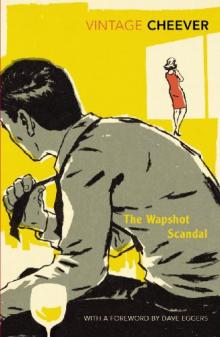 The Wapshot Scandal
The Wapshot Scandal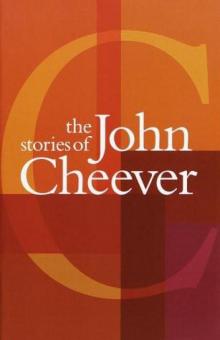 The Stories of John Cheever
The Stories of John Cheever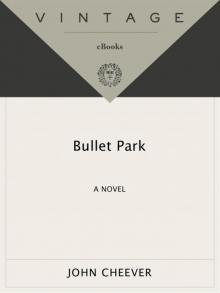 Bullet Park
Bullet Park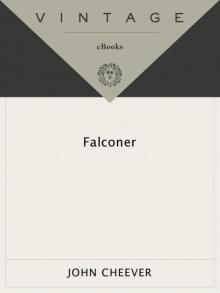 Falconer
Falconer The Journals of John Cheever
The Journals of John Cheever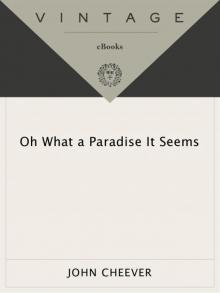 Oh What a Paradise It Seems
Oh What a Paradise It Seems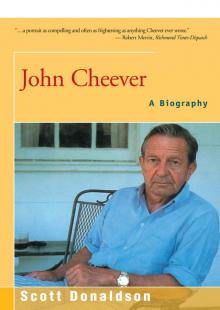 Scott Donaldson
Scott Donaldson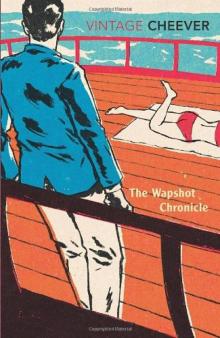 The Wapshot Chronicle
The Wapshot Chronicle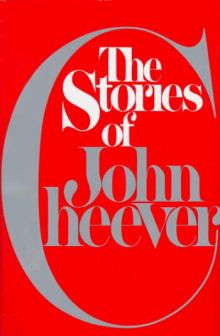 The Stories of John Cheever (1979 Pulitzer Prize)
The Stories of John Cheever (1979 Pulitzer Prize)